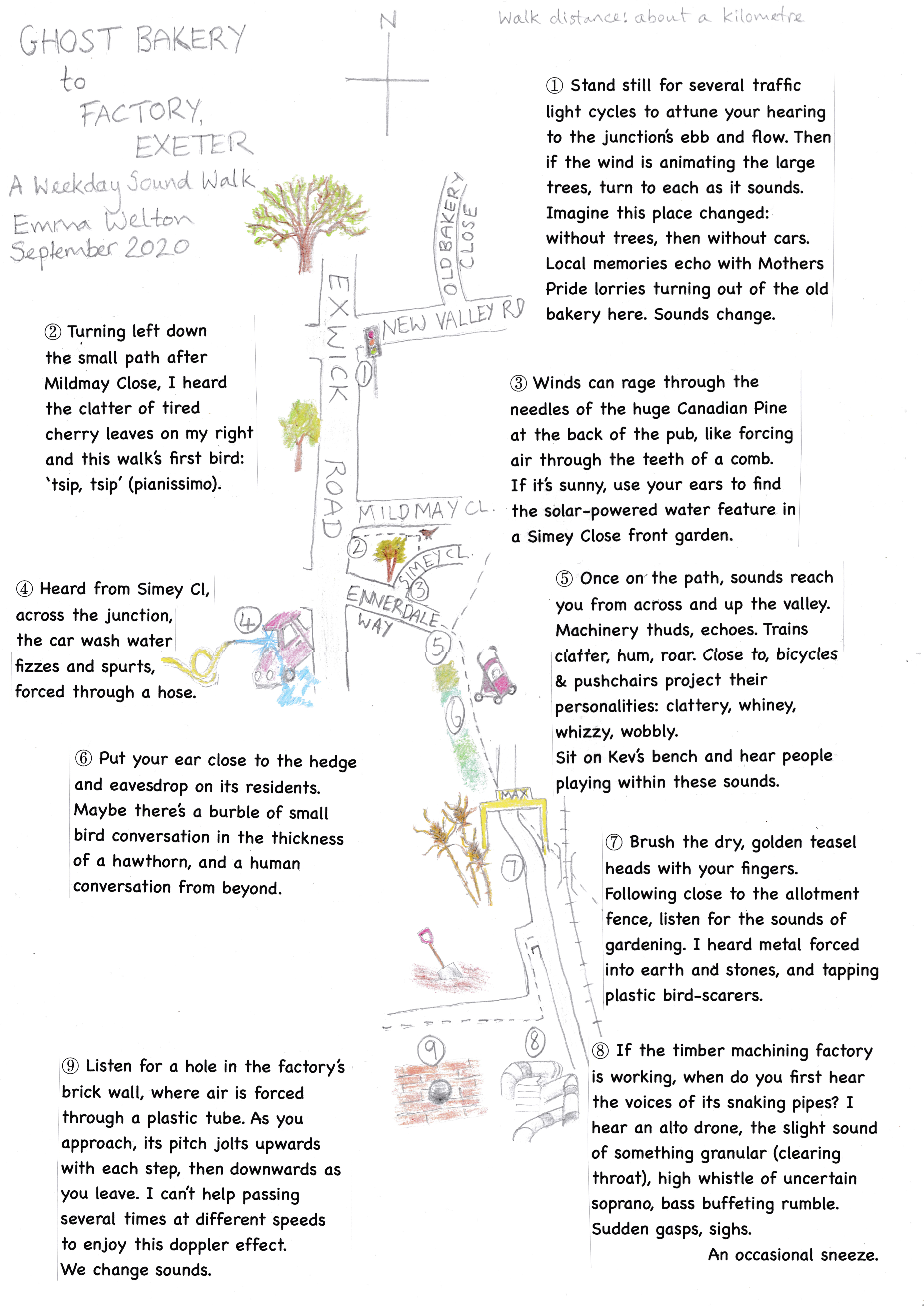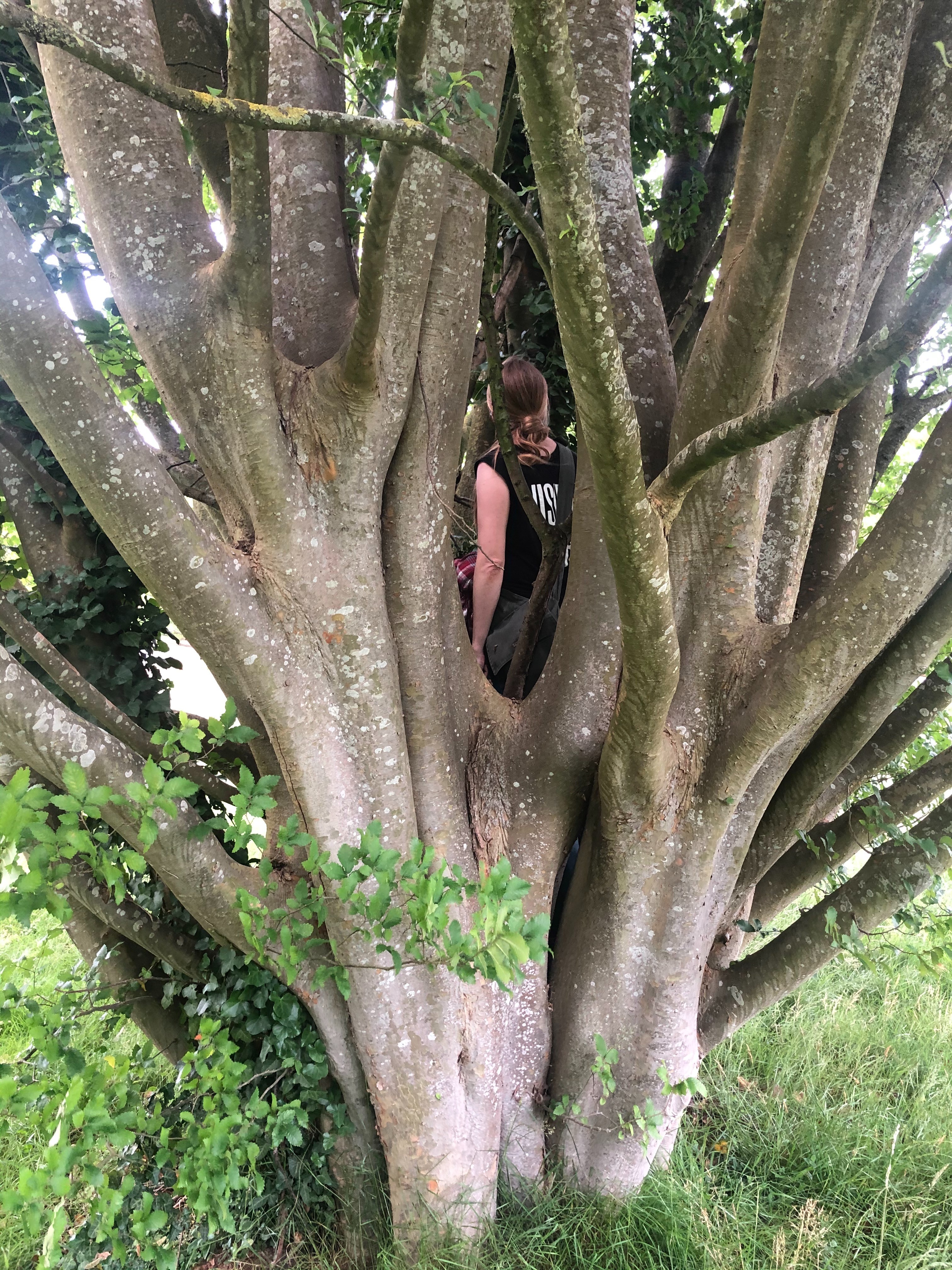
Exeter Sound Walks is a collection of short walks shaping a particular experience and focusing on some of the sounds that can be found. Emma is making two Sound Walks each month for a year, to explore the sounds of her local patch, and the changes that the seasons bring. At the end of the year, the 24 Walks will be published as a book.
Exeter Sound Walks are for people who are open to a different kind of walk, and perhaps to experiencing a familiar place in a new way. Emma’s Walks are drawn in pencil as illustrated maps designed to download as a pdf from emmawelton.net and print on one sheet of A4. They are short in distance (about a mile) and long in pauses. If you do one, make sure you’re not in a hurry.
Some of the sounds are specific to time and place, such the great-crested grebe family on the River Exe Flood Relief Channel who join us for a few months each spring, or a pair of metal signs that have come loose from their fixings and clang different pitches and rhythms in the breeze – one day they might get fixed and the sounds will be gone.
Other sounds are more-or-less continuous like those of a weir or car tyres on asphalt.
Still further, there is the fundamental sound character of a space, which is affected by the texture of the objects the sounds bounce off and the intimacy or expanse of the space.
Emma is learning that Sound Walks are also affected by our own perception. She is currently composing a Sound Walk with a neighbour who hears in mono, and another made with Autistic people in mind.
The Sound Walk idea was conceived in May 2020 for the Exeter Family Orchestra, a project that Emma co-facilitates for the Bournemouth Symphony Orchestra. During lockdown, family orchestra members have been creating music and sound compositions to share without meeting in person. People have made sound walks in widely varying styles: cartoons, photographs with map and text description, annotated aerial photographs, poems. Sound Walks have enabled us to connect our hearts through sharing our listening experiences.
Sound Walks are best done alone (though see ‘Sound Walks, together’ update, below). If you do one, Emma would be glad to hear how you get on. You can leave a message about your experience on her website.
A Sound Walker says, ‘It was wonderful. I don’t normally need a purpose to walk but found I loved having one. I’m used to noticing the beautiful surroundings but not the sounds. The rustle in the first big tree is beautiful and gentle, my favourite thing from the whole walk. I heard so many bird songs by the flood channel. The triangle signs were noticeable on the approach and I thought of the people living above them! The huge Zelkova tree had such a dampening effect on my voice, like she was keeping me safe and contained within her branches for a short while. I circled her too and enjoyed a short chat 💕
Thank you for this.’
Sound Walks, together
Initially I believed that Sound Walks are best done alone. However, in this time of enforced separation we crave activities to do outside, together, safely. People have asked me to lead group Sound Walks, and so ‘Sound Walks, together’ was born in September 2020. We talk little, walk slowly, make space for each other and connect our hearts through shared listening. We talk afterwards.
In October 2020 Emma made a podcast with composer Makoto Nomura and curator Mari Satomura about composing Sound Walks in Exeter and Kyoto. They also compared experiences of being a practising musician during COVID in England and Japan. The podcast is at this address: https://www.mixcloud.com/ArtWorkExeter/contemporary-musician-emma-welton-walks-with-composers-makoto-nomura-and-mari-satomura/
'Large tree, Sophora Japonica & traffic' & text read from Exeter Sound Walk 'TREE to TREE, Exeter, June 2020'
CC-BY-NC: Emma Welton
|




One thought on “Exeter Sound Walks”